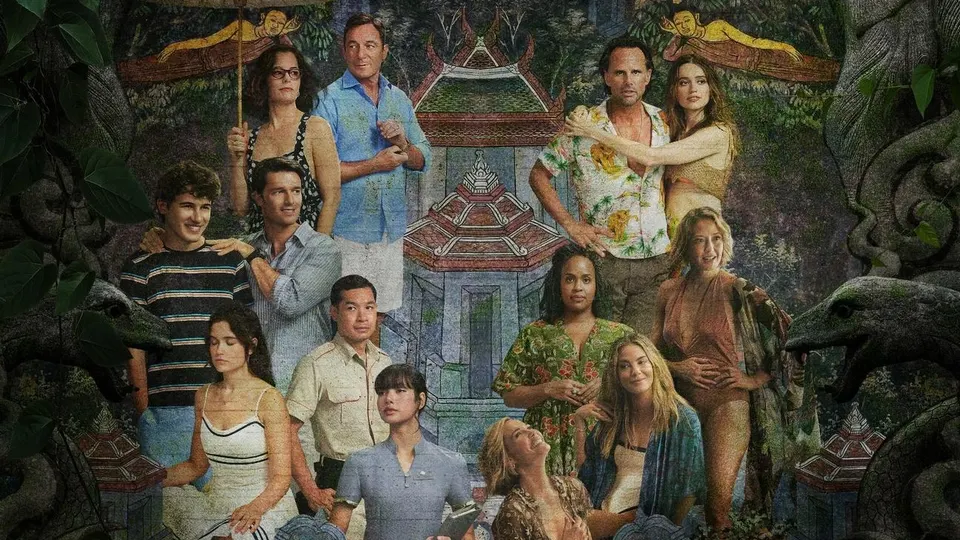The White Lotus Season 3, set against the lush and often exoticized backdrop of Thailand, delivers a razor-sharp satire on the Western “self-discovery” industry. Here, the wealthy flock East in search of meaning—only to pursue it from the sanitized comfort of luxury hotels built to mirror the very world they claim to leave behind.
From the very beginning, we’re shown a contrast: Victoria, an anxious American mother who needs medication just to sleep, and her daughter, Piper Ratliff, who claims she wants to abandon her cushy Western life and join a monastery. But Piper’s spiritual renunciation unravels fast. Her disdain for material comfort turns out to be more aesthetic than actual—a curated detachment that costs nothing. What looks like self-awareness is really just self-rebranding. Unlike her mother, whose dependence is out in the open, Piper cloaks hers in moral superiority. It’s a quieter, more insidious kind of hypocrisy—one that defines a generation fluent in the language of growth but allergic to discomfort.
Timothy Ratliff, the father, simmers with a quiet desperation. His inner monologue is suffused with guilt, repression. His fear is so profound that the thought of being exposed pushes him towards violence. The idea that he would rather destroy his own family than confront himself is chilling, but it’s also telling. White Lotus uses his unravelling to underline a darker truth: switching off your phone and moving to Thailand won’t cleanse you of the things you’ve done. You bring your past with you, no matter how far you fly.
His sons, Saxon and Lochlan, play out a psychosexual drama of masculinity. Saxon embodies the traditional mold—stoic, athletic, emotionally unavailable. Lochlan, by contrast, is sensitive, tentative, and desperate to be brought into the fold. His longing isn’t just for approval—it’s for instruction. He watches Saxon and his father like they’re gatekeepers to manhood, and he’s waiting for someone to hand him the script. What emerges is a painful cycle: sons reaching for connection, and a father too afraid of vulnerability to offer it. The result is a kind of emotional incest—intimate in ways that feel misplaced, even dangerous.
The three women—Kate, Laurie, and Jaclyn—aren’t just struggling with each other; they’re trapped in a version of “feminine empowerment” that’s been branded, bottled, and sold. They claim support and solidarity, but underneath, there’s a constant undercurrent of rivalry, envy, and unspoken resentment. Jaclyn, the actress among them, is the gravitational center—not because of wisdom or insight, but because of fame and status. She’s either totally unaware of her power or weaponizing it in subtle ways. Their dynamic is less about spiritual healing and more about rehearsing the same old scripts of competition and passive-aggression, just now set against a temple backdrop. What they’ve brought with them to Thailand isn’t openness but emotional habits, power plays, and unspoken rivalries they’ve rehearsed for years.
Kate’s relationship with Rick isn’t about romance—it’s about projection. Rick is a damaged man with a violent past, but she treats him like a broken child she can heal. Her desire to save him mirrors the kind of unconditional, delusional love often modeled by mothers who enable more than they nurture. But Rick doesn’t want to be saved. He’s consumed by a personal myth: that confronting or avenging his absent father, will somehow restore his sense of self. But the revenge fantasy collapses. There is no reckoning, no closure—only loss. Rick’s violence rebounds back onto himself, as if to say: in the search for a father, what he really killed was the illusion that he was ever going to be whole. His death isn’t just tragic—it’s inevitable. He was never looking for love. He was looking for a self that never existed.
Even Gaitok, who initially seems to embody quiet spiritual discipline, ends up compromising his values. When asked to kill, he doesn’t hesitate—not because he’s evil, but because his job demands it. His arc makes a stark point: under capitalism, morality bends to necessity. Spirituality sounds noble until it threatens your livelihood.
Ultimately, White Lotus Season 3 dismantles the fantasy that spiritual renewal can be bought—or found—through exotic escapism. It strips bare the Western obsession with “transformation” abroad, revealing it as yet another performance, curated and consumed like everything else. The show doesn’t offer easy answers—it lingers in discomfort, asking: is genuine change even possible, or are we just searching for prettier masks to wear, especially the kind that look good in front of a temple at golden hour?
